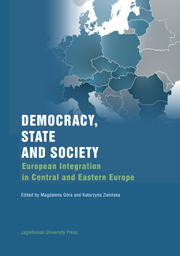Book contents
- Frontmatter
- Contents
- List of contributors
- Europeanisation in the EU New Member States. Aspects and Research Agendas
- Part one Democracy after Enlargement
- Part two Identity Transformations
- Part three Civil Society Organisations in Central and Eastern Europe
- Bottom-up Europeanisation: Civil Society Involvement and EU Governance in the New Member States
- The Europeanisation of Social Movements in the Czech Republic: the EU and Local Women's Groups
- The European Union as Political Resource: NGOs as Change Agents?
- Undiscovered Avenues? Estonian Civil Society Organisations as Agents of Europeanisation
- Part four Europeanisation of International Relations
- Index
Undiscovered Avenues? Estonian Civil Society Organisations as Agents of Europeanisation
from Part three - Civil Society Organisations in Central and Eastern Europe
Published online by Cambridge University Press: 05 September 2014
- Frontmatter
- Contents
- List of contributors
- Europeanisation in the EU New Member States. Aspects and Research Agendas
- Part one Democracy after Enlargement
- Part two Identity Transformations
- Part three Civil Society Organisations in Central and Eastern Europe
- Bottom-up Europeanisation: Civil Society Involvement and EU Governance in the New Member States
- The Europeanisation of Social Movements in the Czech Republic: the EU and Local Women's Groups
- The European Union as Political Resource: NGOs as Change Agents?
- Undiscovered Avenues? Estonian Civil Society Organisations as Agents of Europeanisation
- Part four Europeanisation of International Relations
- Index
Summary
Abstract: Within neoliberal approaches to the study of International Relations there is a consensus that non-governmental actors and their potential impact need to be studied more. This article examines how Estonian civil society organisations are acting as agents in the general Europeanisation processes. The framework within which they operate, the European Neighbourhood Policy and the EU-Russia Strategic Partnership, are both in theory open to participation by the third sector. The EU's foreign policy, being built up to such a large degree around notions of soft power, should also lend itself easily to the kinds of bottom-up approaches to spreading its influence which civil society can help to effect. The empirical work shows, however, that due to both institutional and procedural obstacles, this sort of cooperation is not happening to a great extent, or is at least significantly hampered. On key issues and in terms of priorities the agendas of civil society organisations and traditional state actors also tend to diverge, with the former eager to pursue more normative charged policies, and the latter taking a more traditional approach. The state of civil society in the former Soviet Union also makes this style of policy more difficult. Thus the central argument of this article is that while civil society organisations do offer interesting avenues to explore, the EU has been far too unappreciative of the needs of civil society organisations, and has therefore not been able to fully utilise the resources they could potentially provide.
- Type
- Chapter
- Information
- Democracy, State and SocietyEuropean Integration in Central and Eastern Europe, pp. 221 - 238Publisher: Jagiellonian University PressPrint publication year: 2011



